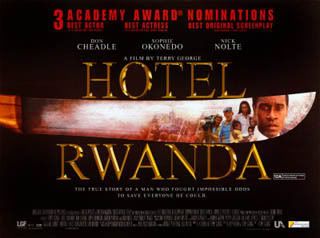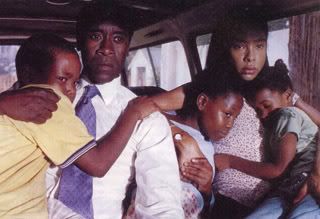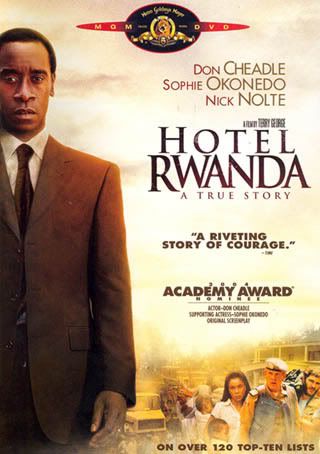Director : Terry George
Writer : Keir Pearson/Terry George
Release Date : 04 February 2005
Genre : Drama/History/Thriller/War
Cast : Don Cheadle, Sofie Okonedo, Nick Nolte

My Review:
Ini salah satu film favorite gw.
Mengambil setting di
Ribuan kaum Hutu terbunuh dan mayat yang bergelimpangan disana sini menciptakan suasan menyeramkan.

Review by David Thomas (Filmcritic.com)
In 1994 an attempted genocide in Rwanda left over 1 million dead. The response of the international community was tepid, at best. The response of one hotel manager, however, was heroic. Hotel Rwanda tells his story with some insight, but perhaps too much restraint.
As the film begins, two tribes are at war. A Hutu majority faces a Tutsi insurgence. A disembodied voice on the radio fans the flames of hate, instigating Hutu violence against anyone even suspected of being Tutsi. None of this seems to affect Paul Rusesabagina (Don Cheadle), a hotelier at the posh Hotel Mille Collines, which caters to European tourists and the local military elite. He keeps politics at arms’ length, using his charm and skill with negotiation to please his clients and superiors. Whatever pull he has is kept in reserve for when he might need it for his own family in the future. This is especially important since, while he is Hutu, his wife Tatiana (an impeccable Sophie Okonedo) is Tutsi.
All of that changes once a coup replaces the moderate president with a Tutsi-hating junta leading an increasingly uncontrollable militia bent on genocide. Paul must hide his Tutsi relatives and friends in his hotel while the UN stands guard outside. As the situation worsens, his negotiating prowess must serve over 800 refugees, all of whom are only a favor or payoff away from execution.
Don Cheadle is outstanding as Paul, at first depicting his quiet ease as a businessman, then his desperation as everything he takes for granted begins to crumble. The moment comes when Paul realizes who his real friends aren’t, and Cheadle’s performance resonates the horror of what Paul has become and how completely he’s been deceived. This, in turn, makes Paul’s conviction all the more believable when he chooses to use his skills, at great risk to himself and others, to save as many Rwandans as possible.
Also serving well in a small but memorable role is Joaquin Phoenix, as a photographer who captures footage of the atrocities while recognizing the ultimate futility of their broadcast. “If people see this they’ll say ‘Oh, my God. That’s horrible,’” he explains to Paul, “Then they go on eating their dinners.” Nick Nolte makes a nice turn as a compassionate, but ultimately impotent UN peacekeeper. He points out just how little Paul and his people mean to the rest of the world. “You’re not even a nigger,” he tells him, “You’re an African.”
One of the things the film does very effectively is in pointing out the disconnect between the horrors taking place in Africa and the response of the world community. Paul tells his refugee residents that they must “shame” the world into taking action. Rwanda seems to be nothing more than an investment or a tourist destination to the powers that be. This is captured perfectly when, as the European guests of the hotel are evacuated and the Rwandans are left behind, a man on the exiting bus snaps a photo.
What the film doesn’t do quite as effectively is capture the visceral horror of the event. It’s very difficult to do a PG-13 film about genocide. To some extent, director Terry George pulls it off. The psychological strain is evident in Cheadle’s performance and in the fear evoked in his guests by each new threat. But this is one of those rare cases where it seems the presentation isn’t violent enough. It feels like the blow has been softened, and this is one punch that should not be pulled. In effect, the audience feels like they’re being given the tourist version of the massacre instead of the real thing. Adding to this watered-down effect is the dialogue, which occasionally lapses into movie-of-the-week caliber. The story here is stronger than the actual screenplay, which is too bad, since this is a tale that deserves to be told with as much impact as possible.

Review Summary from The New York Times)
Stephen Holden
This wrenching political thriller, based on fact, performs the valuable service of lending a human face to an upheaval so savage it seemed beyond the realm of imagination when news of it filtered into the West.
The movie certainly isn't the first screen depiction of a nation consumed in ethnic strife. But its vision of the slaughter of 800,000 Tutsis by the ruling Hutu tribe in Rwanda during a hundred-day bloodbath in 1994, offers a devastating picture of media-driven mass murder left unchecked. The story is based on the real-life experiences of Paul Rusesabagina (Don Cheadle), the soft-spoken Hutu manager of the Hotel Des Mille Collines, in Kigali, who with his Tutsi wife, Tatiana (Sophie Okonedo), and children, narrowly escapes death several times.
Mr. Rusesabagina was directly responsible for saving the lives of more than 1,200 Tutsis and Hutu moderates by sheltering them in the hotel and bribing the Hutu military to spare them. The movie, which is squeamish about showing the full extent of savagery, hammers every button on the emotional console.

Tidak ada komentar:
Posting Komentar